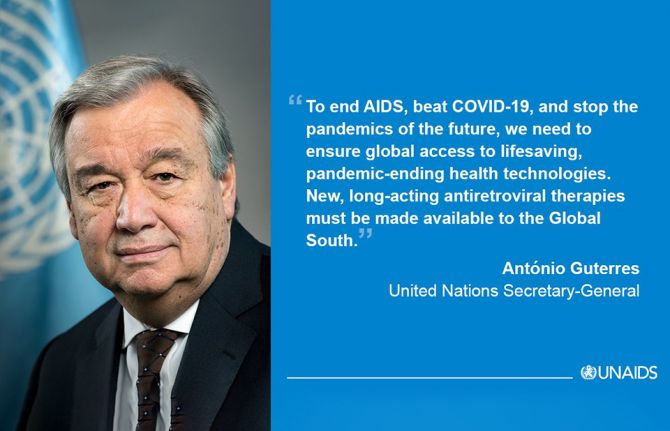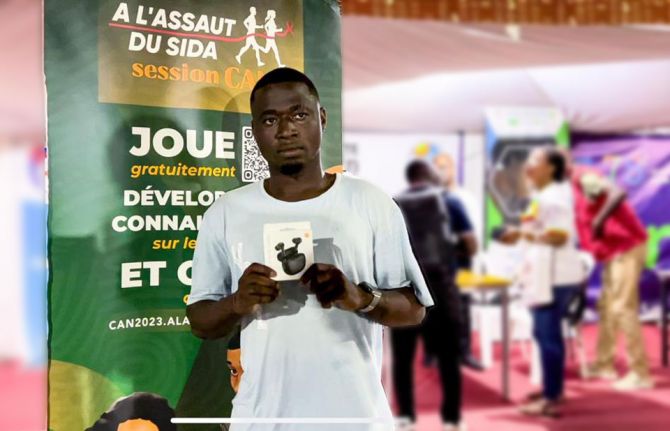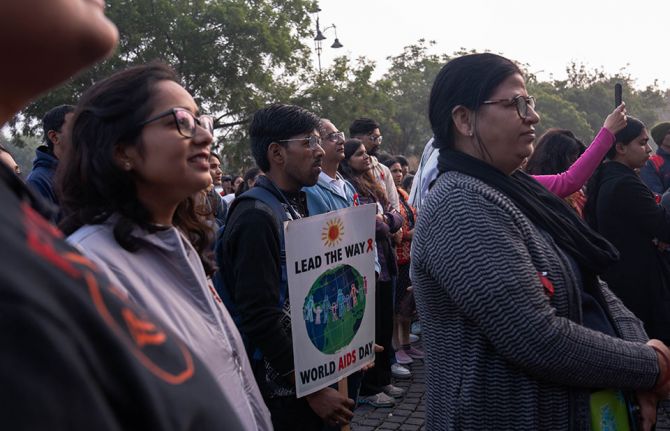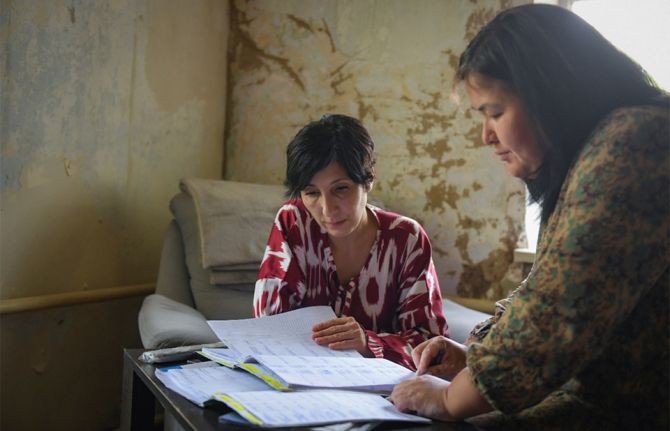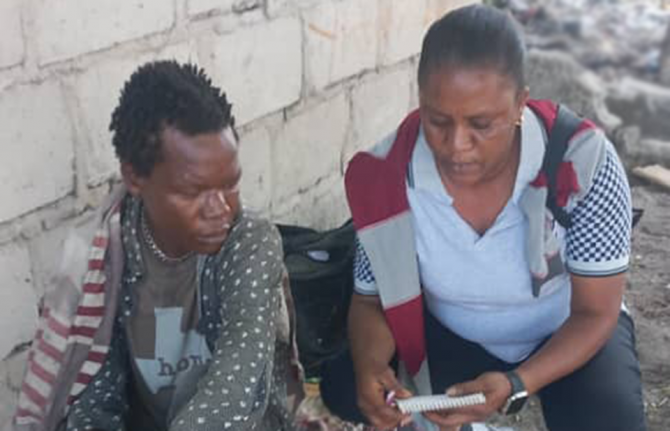
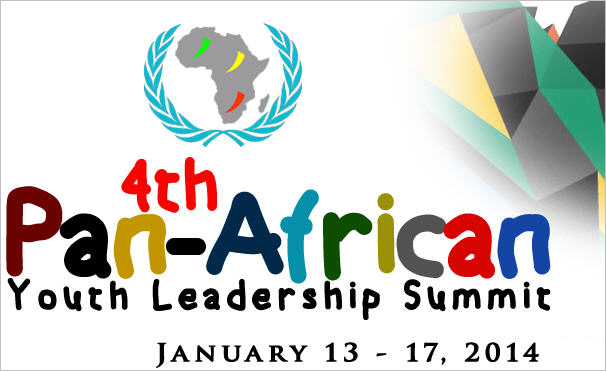
The 4th Pan-African Youth Leadership Summit is taking place from 13-17 January 2014 in Dakar, Senegal.
Update
Young African leaders meet to accelerate action on the MDGs
15 January 2014
15 January 2014 15 January 2014More than 500 young Africans are gathered in the Senegalese capital of Dakar to participate in the 4th Pan-African Youth Leadership Summit taking place from 13-17 January 2014. Participants are sharing ways to effectively contribute to the acceleration of the Millennium Development Goals and play an important role in shaping the post-2015 development agenda.
The event, which runs under the theme "Youth unemployment in the post-2015 development agenda", is organized by the Pan-African Network of Youth Leaders to the United Nations in collaboration with UNFPA and UNAIDS.
Quotes
“Youth participation in the development process in Africa is a priority and an important base for the whole continent."
"Our concerns are fully reflected in the agenda of this summit and we plan to share the recommendations with the youth world at the World youth Summit to be held in September 2014 in New York.”
"When we talk about the challenges of youth, it should be noted that many of the problems they face are rooted on the violation of their human rights, particularly of girls and young women, who are prey to physical and sexual abuse, and gender-based violence, especially in countries in conflict and post-conflict situations in Africa.”
"Young people aged 15 to 24 accounts for nearly 40% of new HIV infections among adults. In 2012, 780 000 young people were infected with HIV and 560 000 of these new HIV infections occurred in sub-Saharan Africa.”

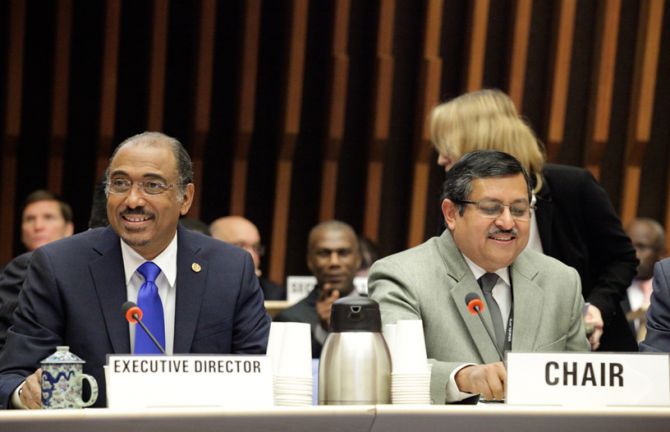
UNAIDS Executive Director Michel Sidibé addressed the Board and gave an overview of the progress made in the AIDS response as well as the challenges ahead.
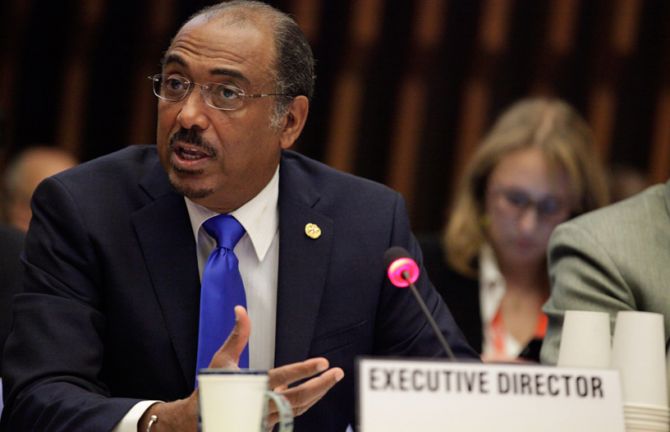
UNAIDS Executive Director Michel Sidibé addressed the Board and gave an overview of the progress made in the AIDS response as well as the challenges ahead.
Update
The 33rd UNAIDS Board meeting opens
17 December 2013
17 December 2013 17 December 2013UNAIDS governing body, the Programme Coordinating Board (PCB) is holding its 33rd Board meeting from 17-19 December in Geneva, Switzerland.
In the opening session, UNAIDS Executive Director Michel Sidibé will address the Board giving an overview of the progress made in the AIDS response as well as the challenges ahead.
Board members will receive a report on the strategic use of antiretroviral therapy for treating and preventing HIV, as well as information on the coordination of HIV technical support in a rapidly changing environment. The Board will also be updated on AIDS in the post-2015 development agenda.
Board members have been encouraged to include young people in their delegations to attend the 33rd UNAIDS Board meeting and the final day of the meeting will be dedicated to a thematic segment on HIV, adolescents and youth.
Speeches

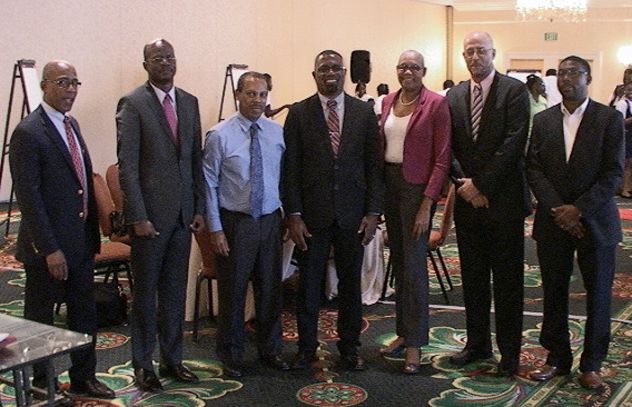
United Nations Secretary General’s Special Envoy for AIDS in the Caribbean, Edward Greene (third from the left) with parliamentarians from the region during the launch of the Justice for All Programme.
Update
Pan-Caribbean Partnership Against HIV/AIDS (PANCAP) launches its Justice for All Programme
13 December 2013
13 December 2013 13 December 2013The Pan-Caribbean Partnership Against HIV/AIDS (PANCAP) launched the Justice for All Programme on World AIDS Day, 1 December 2013. The new initiative will help guide countries as they address AIDS related stigma and discrimination, improve the legal environment and remove discriminatory laws related to HIV.
Under the leadership of the Prime Minister of St Kitts & Nevis and Head of PANCAP, Denzil Douglas, and spearhead by the United Nations Secretary General’s Special Envoy for AIDS in the Caribbean, Edward Greene—national consultations are taking place throughout the Caribbean to pursue legislative reforms and related key programmes to increase justice for all in all countries.
Quotes
“I affirm my commitment to ending AIDS-related discrimination in the region and to advancing the removal of discriminatory laws. Also noteworthy, is the increasingly active role of the faith based organizations at the highest levels, and their willingness to work in collaboration with partners, including parliamentarians, to move forward this important endeavour.”
“This milestone activity is the launch of a social movement in the region. I would like to press leaders to take a firm stance to ensure that human rights are respected not only for some but for all persons including LGBT. I also commend the participants for reaching consensus to make the legislative and other changes required to remove discrimination against all persons, and for outlining the steps required at country level to take this forward.”
"Ending AIDS-related discrimination is central to protecting human rights for all people. I applaud the leaders in the Caribbean region and PANCAP for this important initiative."
Related

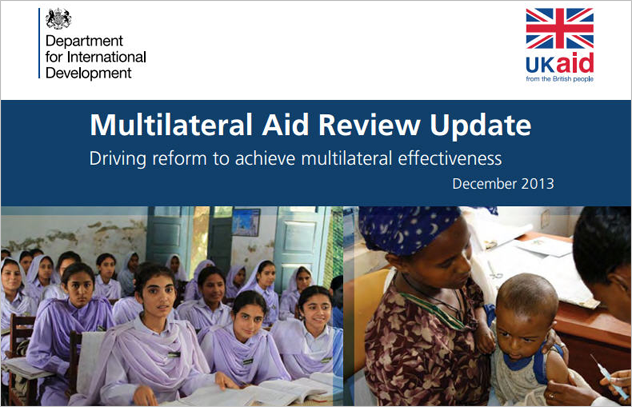
In a report released on 11 December, the United Kingdom’s Department for International Development (DFID) stated that UNAIDS is ‘good value for money for UK aid’.
Update
UNAIDS – ‘good value for money for UK aid’
13 December 2013
13 December 2013 13 December 2013In a report released on 11 December, the United Kingdom’s Department for International Development (DFID) stated that UNAIDS is ‘good value for money for UK aid’.
The report outlines that UNAIDS ‘exceeded expectations’ in cost and value consciousness, notably achieving a 13% efficiency saving (approx. $42 million) in administration costs between 2011 and 2012, following a wide-ranging organizational restructure. Progress in this area was enough for UNAIDS to move to a higher value for money category from their 2011 report, the only organization to do so in this current report.
The 2013 review is used by DFID to determine the level of funding to multilateral organizations. In 2012/2013, DFID gave around £3.25 billion of UK aid as core funding through the multilateral organizations.
As a result of the report’s findings the United Kingdom has increased its contributions to UNAIDS from £10 million a year to £15 million a year for 2013/2014 and 2014/2015.
Quotes
"This report is extremely encouraging and recognizes the work we are doing to improving efficiency and effectiveness. UNAIDS will continue to be focused on strengthening impact and results while reinforcing our unique mechanisms for budgeting, resource allocation, and accountability."

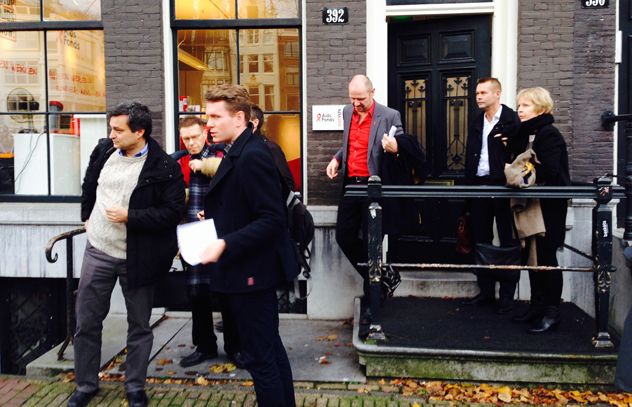
L to R: Alvaro Bermejo (HIV Alliance), Peter Smit (Hiv vereniging), Mark Vermeulen (Soa Aids), Ton Coenen (red shirt), (Aids Fond), Marcel de Kort (Foreign Affairs) and Silke David (RIVM)
Update
No one left behind
12 December 2013
12 December 2013 12 December 2013Criminalization, stigma and discrimination continue to be the main barriers which are preventing people most in need from accessing lifesaving HIV services.
UNAIDS Deputy Executive Director Luiz Loures met with Dutch Aids ambassador Lambert Grijns and government funded community groups in the Netherlands for a two day meeting to reinforce efforts to enhance services for key populations and strengthen their human rights.
The country has been recognized for its pioneering role and willingness to take a high-profile stance on difficult issues related to people who use drugs, men who have sex with men and sex workers and have been a key and consistent player in the global efforts against AIDS.
In Amsterdam’s vibrant red light district, Dr Loures met with Dutch police to discuss law enforcement, sex work and HIV. The police explained that the decriminalization of sex work has had a positive impact on reducing new HIV infections with sex workers more at ease in accessing HIV prevention services, no longer fearing legal reprisals.
Dr Loures encouraged the Netherlands to continue its specialized work with key populations as a global champion for human rights and key populations. The Government and civil society groups will also continue to collaborate with UNAIDS at the country and global level to protect and promote human rights.
Quotes
“Men who have sex with men, sex workers and people who use drugs have to be at the heart of the fight against HIV in order to have impact – that’s the Dutch lesson we learned in the past 30 years and is relevant for other countries. To do this meaningfully requires collaboration between UNAIDS, governments and NGO’s.”
“A targeted and focused collaboration between UNAIDS, Dutch-funded NGOs and Dutch Embassies in selected countries will create synergy and help raise impact. The Dutch experience on working with key populations proves to be an inspiring example.”
"Protecting and respecting the human rights of all people is essential in ensuring access to health services. Everyone has the right to health and no one should be denied because of who they are or how they live their lives."
Related

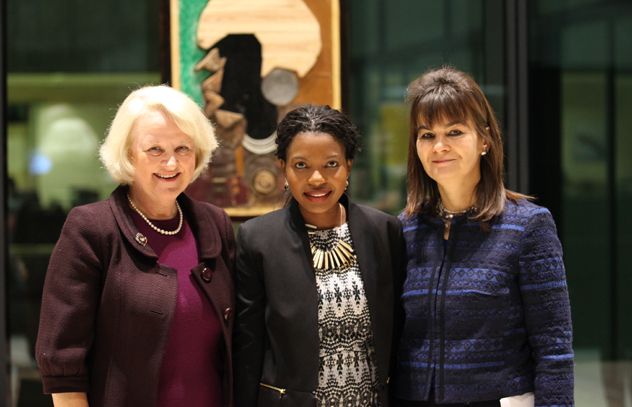
L to R: Jan Beagle, UNAIDS Deputy Executive Director, Management and Governance; Hem Matsi, Director of Victims2Survivors in Namibia; H.E. Ambassador Ms. Sabine Böhlke-Möller, Permanent Representative of Namibia to the United Nations Office in Geneva. Credit: UNAIDS
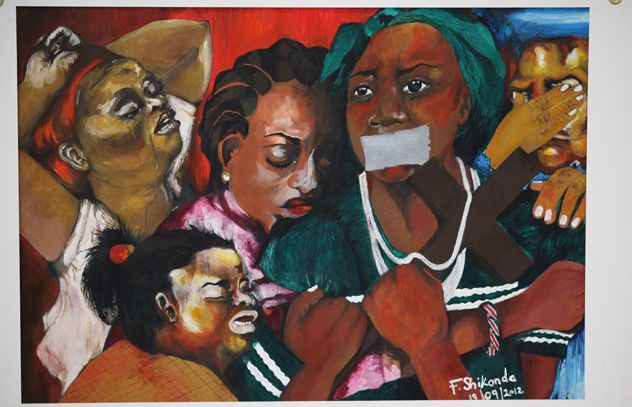
One of the artworks of the exhibition titled “Mother’s sorrow” by Findano Shikonda (Namibia). Credit: UNAIDS
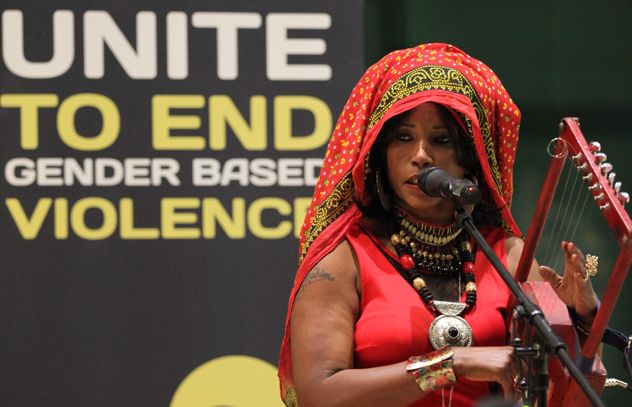
Faytinga, star singer from Eritrea, performing at the opening of the exhibition. Credit: UNAIDS
Update
Breaking the silence around gender-based violence
11 December 2013
11 December 2013 11 December 2013The link between gender-based violence and HIV as both a cause and consequence of HIV is increasingly recognized. Studies show that women living with HIV are particularly vulnerable to sexual, physical and psychological violence, reporting violations of their sexual and reproductive rights, including coerced abortion and forced sterilization. Addressing gender-based violence is therefore critical to preventing new HIV infections and AIDS-related deaths.
Statistics from the World Health Organization around violence against women are compelling; globally, one in three women experience physical or sexual violence by a partner and 38% of all murders of women are committed by their intimate partners. In addition, up to 45% of adolescent girls around the world report that their first sexual experience was forced.
As in many other countries around the world, gender-based violence is widespread in Namibia. This type of violence is often invisible, as it frequently happens behind closed doors. Many survivors remain unknown and forgotten, hidden away in a society where gender-based violence generates a sense of shame among the victims, rather than among the perpetrators.
As part of efforts to eliminate gender-based violence in Namibia, the First Lady of Namibia, Mrs Penehupifo Pohamba, launched the ‘Unite to End Gender-based Violence’ art exhibition at the National Art Gallery of Namibia in June this year. The exhibition featured 60 works of art that were selected from over 200 submissions by Namibian artists, all centred around addressing gender-based violence.
The exhibition was part of an initiative organised by Ms Hem Matsi, Director of Victims2Survivors and a group of young people who climbed Mount Brandberg in April 2013, calling for the end of gender-based violence in Namibia. It showcases Namibia’s innovative and creative initiative to break the silence around gender-based violence and mobilize people and communities to join forces in eliminating gender-based violence.
Reaffirming shared commitment around eliminating gender-based violence, the Permanent Mission of Namibia to the United Nations in Geneva, Victims2Survivors, the National Art Gallery of Namibia and UNAIDS, have brought 24 works of art from the ‘Unite to end Gender-based Violence’ exhibition to Geneva to be displayed at UNAIDS Headquarters from the 10 to 20 December 2013.
The exhibition was opened by Ms Sabine Böhlke-Möller, Ambassador of Namibia to the United Nations Office in Geneva, Ms Jan Beagle, UNAIDS Deputy Executive Director, Management and Governance, Ms Hem Matsi, President of Victims2Survivors, and Ms Golda Ha-Eiros, Curator of the National Art Gallery of Namibia. The opening was held on 10 December to mark the final day of the annual 16 Days of Activism to end Gender-based Violence campaign and International Human Rights Day. The opening reception, which also featured a musical performance by Eritrean musician Faytinga, was attended by over 80 guests from diplomatic missions, international organisations, civil society representatives and UN staff.
Quotes
"Each of these pieces of art expresses differently the multidimensionality of the artist’s feelings; better than words could describe it. Even if the theme is a tragic and sad one, I believe that you will appreciate the message behind it and support us in our endeavor to realize the full potential of women and their enjoyment of human rights and fundamental freedoms."
"It is clear––we cannot be neutral and we cannot be silent when it comes to ending AIDS and violence against women. Each and every one of us has a role to play in creating a world where all women are able to reach their full potential in safe and equitable environments."
“Art is a powerful medium. That is why we took advantage and initiated the Unite to End Gender based violence art exhibition with the aim to educate, share experiences, involve youth and raise awareness on gender violence in Namibia and the world”

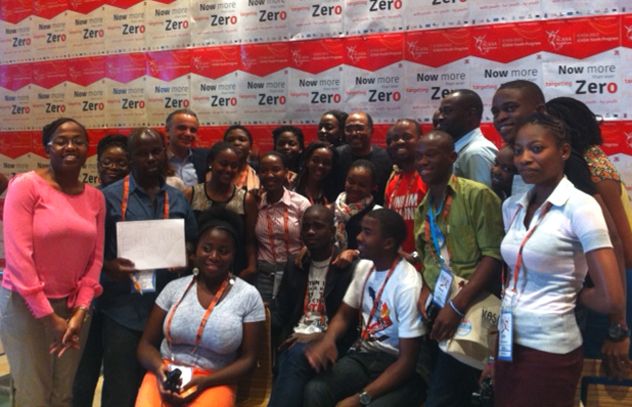
Youth group.
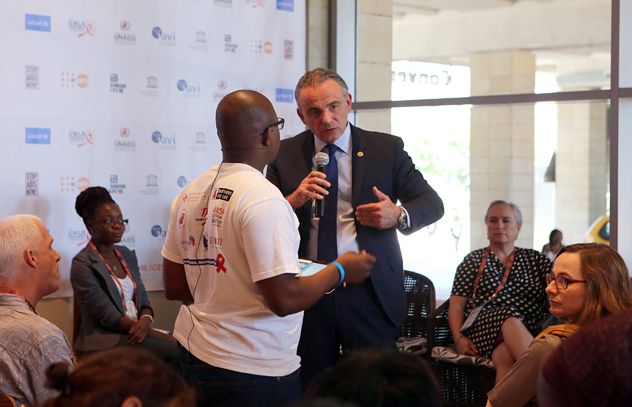
Luiz Loures, Deputy Executive Director, Programme, UNAIDS.
Update
Youth leaders affirm their commitment to ending the AIDS epidemic
11 December 2013
11 December 2013 11 December 2013Young people from all over Africa reaffirmed their commitment to ensure that AIDS related promises are fully implemented in Africa. Youth leaders made the announcement at a press conference held on 8 December at the XVII International Conference on AIDS and Sexually Transmitted Infections in Africa (ICASA). This was just one of the many events throughout the conference where young people demonstrated their leadership role in the AIDS response.
In an earlier meeting with youth delegates, UNAIDS Executive Director, Michel Sidibé called on young people to ensure that HIV is prominently included in the new post-2015 health and development agenda. He stressed the need for youth leadership in galvanizing a movement for social change and shaping the future of the AIDS response.
At ICASA, the African Young Positives Network (AY+) collected more than 5 000 signatures calling for a specific goal on the end of AIDS by 2030. Many young people, civil society, representatives of international organisations and ICASA participants became signatories of the petition.
UNAIDS Deputy Executive Director, Luiz Loures alongside Julitta Onabanjo, UNFPA Regional Director for eastern and southern Africa, Louise Van Deth, Executive Director of Stop AIDS Now!, Dr Joyce Mumah, youth leader, and Stella Nantumbwe Miss Uganda 2013/14 opened the Youth Pavilion. Speaking at the opening, Dr Loures said UNAIDS and its co-sponsors are committed to keeping young people central to the HIV agenda. He also emphasized on the need for strong and continued youth activism to ensure inclusive and sustained AIDS responses throughout the African continent.
In recognition of young people’s needs, ministers of health and education in eastern and southern Africa agreed to 10 key commitments to scale up comprehensive sexuality education and services for young people in the region. These commitments follow a recent UNESCO report: Young People Today, Time to Act Now, which brings together significant evidence on the challenges posed by the AIDS epidemic among youth in the region, especially for young women.
In 2012, an estimated 780 000 youth between the ages of 15-24 were newly infected with HIV in the world and 560 000 of new infections among young people occurred in Africa during the same year.
Quotes
“We need to make sure that we have an HIV goal to end the AIDS epidemic by 2030. Ending AIDS depends on three things – zero new HIV infections, zero discrimination and zero AIDS related deaths. It can be achieved”
“HIV doesn’t discriminate. So why should we discriminate against each other? The fight against this epidemic should focus on inclusion. I have decided to play my part as a musician to ensure that no one is left behind.”
“As young political leaders, young people need to think about how they claim the space for the post-2015 agenda. They need to push leaders at political space and not just at service delivery or systems level. This requires putting accountability on national leaders.”
“The AIDS response should be cognisant of local complexities and should not be a ‘one size fits all’. AIDS is a global challenge but we need to make sure that the science and HIV programmes are tailored for the local setting.”
Related

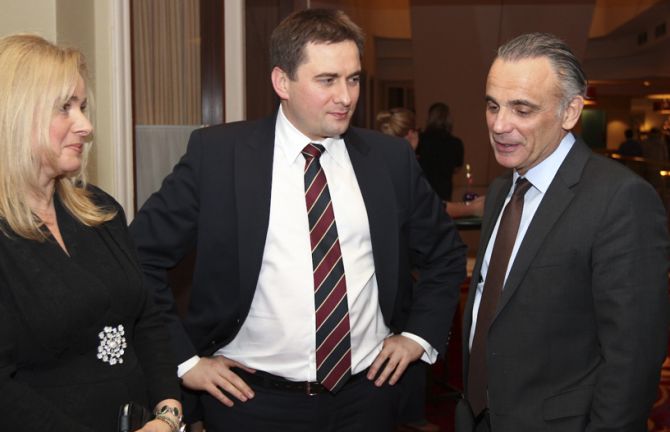
Dr Anna Marzec-Boguslawska, Director National AIDS Council Poland; Dr Igor Radziewicz-Winnicki, Undersecretary of State for Health of Poland and Luiz Loures UNAIDS Deputy Executive Director, Programme. Credit: Adam Adamus.
Update
Renewal of HIV prevention activities needed in Poland
10 December 2013
10 December 2013 10 December 2013At the 20th Polish National Conference for people living with HIV on 2 December 2013, government and civil society leaders highlighted the need for a renewal of HIV prevention activities if Poland is to achieve zero new HIV infections, zero discrimination and zero AIDS-related deaths.
This event, organized in Warsaw by the Res Humanae Foundation in collaboration with National AIDS Center, was also held to mark World AIDS Day 2013 and 20 years of the National AIDS Programme in Poland.
Speaking at the event, Dr Igor Radziewicz-Winnicki, Undersecretary of State for Health, reiterated Poland’s commitment to ending its AIDS epidemic as well as continuing its solidarity and collaboration with neighbouring countries. UNAIDS Deputy Executive Director, Programme, Dr Luiz Loures congratulated Poland for scaling up access to antiretroviral treatment and highlighted the increasing concern across Europe at growing rates of new HIV infections among key populations particularly among men who has sex with men.
New HIV infections have risen in Eastern Europe and Central Asia by 13% since 2006. In Western Europe men who have sex with men represent 42% of all diagnosed HIV cases, and have increased by 6% from 2006 to 2012.
Dr Loures called for greater European solidarity and underscored UNAIDS’ commitment to strengthening its collaboration with Poland and other countries in Europe. He said UNAIDS would support countries in raising political visibility and mobilising communities to address stigma and discrimination and ensure access to HIV services for people most affected by the epidemic.
Quotes
“Ending the AIDS epidemic is possible and should be the vision for the future”
“To end AIDS we have to act as a team. Ending AIDS is a team discipline and there is a concrete role for every player”
“Ending AIDS will not be possible if we are leaving anybody behind. We must do better to ensure access to HIV services for all and to achieve the goal of zero discrimination.”
Related

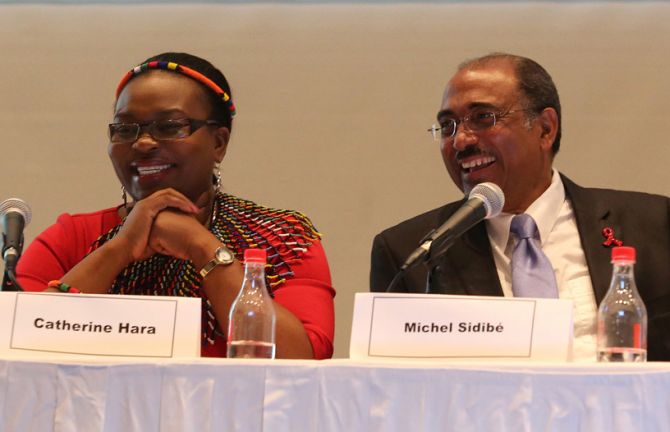
Catherine Hara, Minister of Health, Malawi; and Michel Sidibé, UNAIDS Executive Director
Update
Scaling up HIV treatment in Africa
09 December 2013
09 December 2013 09 December 2013“HIV treatment is a game-changer” was one of the main messages from participants at a key session on Scaling up HIV treatment in Africa: 2015 and beyond.
Held at the XVII International Conference on AIDS and Sexually Transmitted Infections in Africa (ICASA) on 8 December, the session explored strategies for scaling up access to HIV treatment in Africa to achieve the goal of universal access. Participants discussed how to leverage the current moment of opportunity in the global HIV response to lay the groundwork for the end of the AIDS epidemic.
Panelists included Michel Sidibé, UNAIDS Executive Director; Mark Dybul, Executive Director of the Global Fund to Fight AIDS, Tuberculosis and Malaria; Caroline Ryan, Deputy Global AIDS Coordinator (PEPFAR); Catherine Hara, Minister of Health, Malawi; Kenly Sikwese, Coordinator, AFROCAB; and Brian Williams, Chair of the Board of Trustees, SACEMA. About 800 representatives from international organizations, political groups, scientists and civil society representatives attended the meeting.
From 2006 to 2012 the number of people accessing ART in Africa rose from slightly more than 1 million to 7.6 million, a 400% increase. While much progress has been made, the continent is facing new challenges in its advance towards universal access to HIV treatment.
Quotes
"Treatment is not only about pills. Treatment is about life, rights, dignity, investment and the democratization of access through innovation, simplification and centralising the role of the community."
“Our collective goal is the end of the AIDS epidemic, and treatment is one element to reach that goal.”
“The United States is committed to the AIDS response. Last week, President Obama signed the re-authorization of the President’s Emergency Fund for AIDS Relief (PEPFAR).”
“Local leadership is key to accelerating access to HIV treatment.”
“Along with anaesthetics, vaccination and antibiotics the discovery and development of anti-retroviral drugs ranks among the greatest medical advances of all time. When the end of AIDS has come the human cost will have been extremely high but the legacy of our struggle will be the knowledge it has given us on how to manage and control the myriad of other viral diseases that threaten and afflict us.”
Multimedia
Multimedia
Related

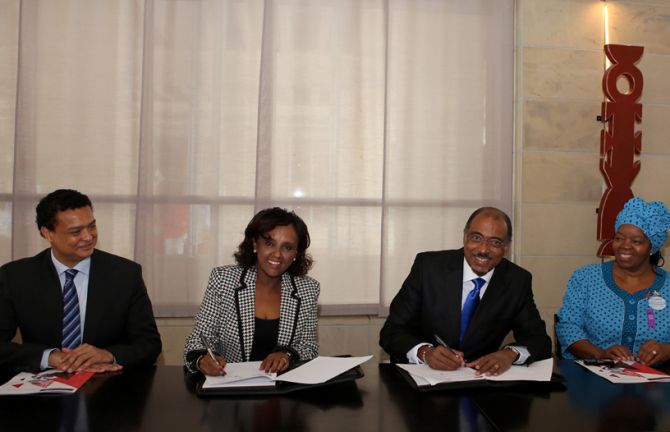
L to R: Chair of the Board of Directors for the African Society for Laboratory Medicine, Trevor Peter; Chief Executive Officer of the African Society for Laboratory Medicine, Tsehaynesh Messele; UNAIDS Executive Director, Michel Sidibé; and Director of UNAIDS Regional Support Team for Eastern and Southern Africa, Sheila Tlou.
Update
UNAIDS and the African Society for Laboratory Medicine formalise partnership to improve laboratories and access to HIV testing
09 December 2013
09 December 2013 09 December 2013UNAIDS and the African Society for Laboratory Medicine (ASLM) signed a Memorandum of Understanding on 8 December to collaboratively improve access to HIV testing and strengthen health systems throughout Africa.
The aim of the collaboration is to improve access to inexpensive, accurate and simple HIV and TB diagnostics to ensure the long-term effectiveness and quality of antiretroviral therapy (ART), which is key to achieve the objectives of the UNAIDS 2015 Treatment Initiative.
The ASLM is committed to supporting efforts to expand access to key diagnostics through its 2020 strategic vision—strengthening laboratory workforce development, improving laboratory accreditation, harmonizing regulatory systems and strengthening national and regional laboratory networks.
Quotes
“We must ensure people living with HIV have access to quality laboratory services in Africa. We continue to fail children because we do not have adequate diagnostics and laboratory capacity. HIV testing needs to be simpler, quicker, more cost-effective and more widely available, so that we can fast-track lifesaving treatments to our communities.”
“Coordinated efforts, based on best practices, are essential for building effective HIV programmes. Effective implementation can produce significant benefits for millions of patients without access to HIV testing and will substantially improve the effectiveness of HIV treatment and prevention services.”




